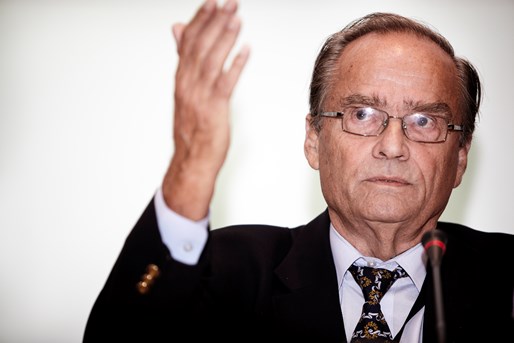Being a real woman: A matter of testing or self-declaration?

Chair of the IOC's Medical Commission, Arne Ljungqvist explained the IOC's take on the gender issue. Photo: Tine Harden
05.10.2011
By Kirsten SparreBoth solutions were put forward in an intense discussion at Play the Game about what sport should do with athletes who have changed sex or for other reasons do not fit into the normal categories of male or female.
The first solution was suggested by Arne Ljungqvist, Chair of the IOC's Medical Commission. For the past 25 years he has worked within international sports federations on finding ways to protect female athletes from competing against men.
For the IOC, the question is mainly biological: Is a given athlete eligible to compete in a female competition? Over the years, the IOC and international sports federations have attempted to settle this question with controversial tests and gender screening of all female athletes - a practice that was only abandoned within the last ten years.
Ljungqvist has been a passionate campaigner against the general gender screening and is the architect behind a new decision from the IOC's Executive Commission about what he calls eligibility to take part in female competitions. Now all females recognised as such by law should be eligible to compete in female competitions provided she has androgen levels below the male range or, if within the male range, she has an androgen resistance.
The key point for Ljungqvist is that the new test of androgen levels will only be applied if it is deemed necessary by relevant authorities in individual cases. Not all women have to be tested.
In the past ten years, Ljungqvist has only seen a handful of cases of such cases, but nevertheless he believes it is important to spend time and money on finding out how best to do it.
"We have to do it to protect the women who compete against them. This is what they want," he said.
'Let us commit to inclusion'
Self-declaration of gender as a way of resolving increasing gender confusion in sport was proposed by professor Bruce Kidd from the University of Toronto.
Kidd was less concerned about the potential benefit that a man who had undergone sexual reassignment and become a woman could have in the competition against other women. There are so many other factors that also affect performance, he argued.
Instead he saw the question of gender as an issue of identity - something which should be protected by the Olympic movement.
"Self-identity is fundamental to human rights and the ideal of self-experession that is the basis for Olympic sports. How can the Olympic movement serve as a beacon of universiality and then single out this one difference," he asked.
"Let's be politically committed to inclusion. If one in 2000 babies is born with atypical sexual characteristics, that is a huge population. We should welcome them into the Olympic family, instead of casting doubt and aspersion on them," Kidd said.






working wit top experts, as the IOC has never tested one athlete, and done only hypothetically, which actual science does not support Ljungqvist's and the IOC's claims, which has led too the great human rights abuses and tragic situations for female athletes do to the IOC's inability, and seems not wanting to purposely now disregard the medical and scientific evidence, that what they have done to women and variance of gender, of which all women and men have - there is not such thing as a (2) poles sexed society. Human physiology is a blending. We do not do this to men, and we should not do this to women.
Women are paying a dear price for the gross negligence on the behalf of the IOC. The IOC is the biggest threat to women and women's sport, as history has shown clearly not the athletes, only to have catastrophic outcomes.
We must stop gender testing of women...
When the IOC and the sporting world take a fresh stance and start from an aspect of 'inclusion', with respect to all natural human diversity, then we might see some progress. Dr Bruce Kidd is on the right track.
Get the 'old boys' out of sport, and bring in new fresh people and attitudes.